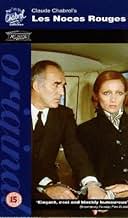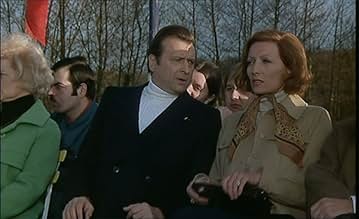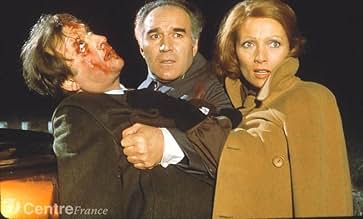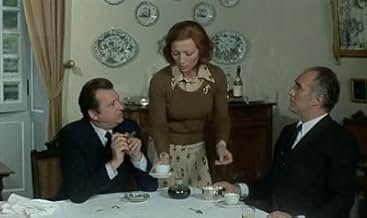IMDb-BEWERTUNG
6,9/10
2147
IHRE BEWERTUNG
Stimmungsvolles Bild einer obsessiven, erotischen Affäre zweier Verheirateter - mit dramatischer Konsequenz.Stimmungsvolles Bild einer obsessiven, erotischen Affäre zweier Verheirateter - mit dramatischer Konsequenz.Stimmungsvolles Bild einer obsessiven, erotischen Affäre zweier Verheirateter - mit dramatischer Konsequenz.
- Regie
- Drehbuch
- Hauptbesetzung
- Auszeichnungen
- 1 Gewinn & 1 Nominierung insgesamt
Empfohlene Bewertungen
In a small town in France, the mayor Paul Delamare (Claude Piéplu) invites the leftist Pierre Maury (Michel Piccoli) to be his deputy mayor in his reelection. Paul is married to Lucienne Delamare (Stéphane Audran) and stepfather of Lucienne's teenage daughter Hélène Chevalier (Eliana De Santis), but sexually neglects Lucienne. Pierre is married to the weak, sick and bitter Clotilde Maury (Clotilde Joano). Soon Pierre and Lucienne have a torrid lover affair during Paul's frequent travels to Paris. When Clotilde dies, the doctor believes it was a suicide, and the case is closed by the police. Paul proposes a dirty real estate business to Pierre to lure the inhabitants of the town and make lots of money, but Pierre is reluctant to accept the proposal. Pierre discloses to Lucienne that he killed Clotilde that was very ill, and they should take care with their encounters to avoid gossips and suspicion from the locals. When Pierre travels to Paris, Lucienne spends the night with Pierre, and when she returns home at 4:00 AM, Pierre surprises her since he has not traveled. He calls Pierre and uses his affair to force Pierre to accept the dirty deal. Now Paul will travel to Paris, and Lucienne asks him to go with him. While Lucienne is driving in the lonely road, she stops the car on the shoulder and Pierre kills Paul and burns the car to the ashes simulating an accident. The police clear Lucienne and close the case as car accident, but Pierre advises her not to see each other for a long period. Everything is perfect for the two lovers until something unexpected happens.
"Les noces rouges", a.k.a "Wedding in Blood" (1973), is a suspenseful romance by Claude Chaborl, with naive plot point and conclusion. The plot is excellent until the moment that Hélène writes a letter to the chief of police. Maybe such naivety could be acceptable in 1973, in the countryside of France. However, on the present days, it would be ridiculous. But the politician Pierre confessing his murders, including his wife's one, and without a lawyer is not acceptable. Romantically it might work but is not credible. My vote is seven.
Title (Brazil): "Amantes Inseparáveis" ("Inseparable Lovers")
"Les noces rouges", a.k.a "Wedding in Blood" (1973), is a suspenseful romance by Claude Chaborl, with naive plot point and conclusion. The plot is excellent until the moment that Hélène writes a letter to the chief of police. Maybe such naivety could be acceptable in 1973, in the countryside of France. However, on the present days, it would be ridiculous. But the politician Pierre confessing his murders, including his wife's one, and without a lawyer is not acceptable. Romantically it might work but is not credible. My vote is seven.
Title (Brazil): "Amantes Inseparáveis" ("Inseparable Lovers")
I was very surprised upon reading some of the comments for this film after having seen it - not only is this not a lesser Chabrol movie or a non-entertaining one, for my money its Chabrol at his subtle and intriguing best, and no doubt up there with the likes of The Unfaithful Wife and Le Boucher! The plot is not particularly original, but it's not too important as it's Chabrol's style and attention to detail that really makes the film what it is anyway. The plot seems to take a lot of influence from the classic 'The Postman Always Rings Twice' and focuses on murder due to an illicit love affair. Lucienne Delamare is not so happily married to town major Paul Delamare and, unbeknown to her husband, is currently engaged in an affair with her husband's assistant Pierre Maury. The two are able to spend time together because Paul is often away on business. Pierre's wife Clotilde is weak and sick and when she dies suddenly, the town suspect suicide; but the truth is more sinister, as revealed by Pierre's confession to Lucienne...
The film is kept interesting as Chabrol always focuses on the important elements and ensures that the chemistry between the leads is always engaging. The acting is once again superb with Chabrol's beautiful wife (at the time) Stéphane Audran being suitably brooding and mysterious in the lead role and receiving excellent support from Michel Piccoli and Claude Piéplu. The village in which the film takes place is also well thought out and Chabrol manages to create a foreboding atmosphere stemming from that. As usual with Chabrol films, this one is beautifully shot and realised and it's clear that the director put a lot of care and attention into the film. As usual, the suspense is generated through intrigue and the way that the characters are developed rather than through scenes of tension, though there are some brilliant sequences in the film - a pivotal scene towards the end involving a car accident being particularly noteworthy. I wouldn't recommend this film as a starting point for someone who has not previously seen a Claude Chabrol film, but I'd be surprised if fans of his don't enjoy it. Highly recommended!
The film is kept interesting as Chabrol always focuses on the important elements and ensures that the chemistry between the leads is always engaging. The acting is once again superb with Chabrol's beautiful wife (at the time) Stéphane Audran being suitably brooding and mysterious in the lead role and receiving excellent support from Michel Piccoli and Claude Piéplu. The village in which the film takes place is also well thought out and Chabrol manages to create a foreboding atmosphere stemming from that. As usual with Chabrol films, this one is beautifully shot and realised and it's clear that the director put a lot of care and attention into the film. As usual, the suspense is generated through intrigue and the way that the characters are developed rather than through scenes of tension, though there are some brilliant sequences in the film - a pivotal scene towards the end involving a car accident being particularly noteworthy. I wouldn't recommend this film as a starting point for someone who has not previously seen a Claude Chabrol film, but I'd be surprised if fans of his don't enjoy it. Highly recommended!
Claude Chabrol started as part of the nouvelle vague,as contemporary of Truffaut and -yuk!- Godard ,but his roots are in the old cinema,that of Clouzot and Duvivier.That's why his best movies hold up very well today.
A first golden era included such works as "à double tour" "le beau Serge" and "les cousins".Then came a period of barren inspiration which ended with "les biches" (1967) with which Chabrol entered his most fruitful period the 1967-1973 era:at least five of the works of this time are first-rate works :"la femme infidel" (1968;dubious American remake);"the beast must die" (1969) ;"the butcher" (1969) his towering achievement;"la rupture"(1970) his most underrated ;"juste avant la nuit" (1971) and finally "les noces rouges" which seems today as the last hurrah,a farewell to a golden era.
Unlike the four other films I mention "les noces rouges" is based on a true story which was widely talked about in France of the early seventies.But ,true or not,Chabrol's touch is strong and he makes the story a chabrolesque plot to the core.The bourgeois whom Chabrol depicted in "la femme infidel" or "la rupture" ,and who was played by Michel Bouquet has turned into a caricature.Enter Claude Piéplu,and with his high-pitched voice,he almost overshadows the excellent Stephane Audran and Michel Piccoli.An impotent self-satisfied mean bourgeois with political ambitions ,he accepts his wife's(Audran) affair with his deputy mayor(Piccoli) ,more,it's fine with him because it will be useful for his shady business.The scene when he tells the lovers so is incredible;lines such as "I want everybody to be happy around me!" he delivers to a stunned Piccoli and a bewildered Audran give goose pimples.
You will notice the omnipresence of water:in "que la Bete meure" and "le boucher" ,it symbolized a return from hell,not necessarily a happy end but a world with some peace of mind.In "les noces rouges" it appears during the love scenes (played by the two actors with more gusto than usual :never in a Chabrol movie the carnal act had been -and will be-so much to the fore)as a symbol of innocence (after all, the two people have no sex with their legal partners)in the sin.But it's the heroine's daughter ,called Helene ,who epitomizes innocence and some kind of deus ex machina.
What's more puzzling is that Stephane Audran's characters were all called Hélène in the four other movies I mention:in "la femme infidel' Helene had a lover but with some excuse :her husband appeared like a washout sexually;in "le boucher" she was a brave schoolteacher ,purity flesh on the bone;in "la rupture" her character had to fight against a hostile bourgeois world .In "les noces rouges" Audran ,called Lucienne,is on the other side of the mirror:she really becomes a criminal,almost in a dream .When her daughter,Hélène,who took the place she occupied in former movies asks her "I want you to be happy,mom,please tell me the truth" Audran does not seem to realize all that means.And when she does,it will be too late.
Les noces rouges" is also a movie which depicts political life circa 1970 in a small town where gossips run rampant.And as usual,Chabrol is marvelous when it comes to painting vignettes of ordinary life -see the scene in the library-
It would take Chabrol five years to muster this sort of command ("Violette Nozieres" (1978)),and although he has occasionally made great works ("l'enfer" " la cérémonie" ),he will be remembered in fifty years or so for those gems of the late sixties/early seventies era."Les noces rouges" is a must.
A first golden era included such works as "à double tour" "le beau Serge" and "les cousins".Then came a period of barren inspiration which ended with "les biches" (1967) with which Chabrol entered his most fruitful period the 1967-1973 era:at least five of the works of this time are first-rate works :"la femme infidel" (1968;dubious American remake);"the beast must die" (1969) ;"the butcher" (1969) his towering achievement;"la rupture"(1970) his most underrated ;"juste avant la nuit" (1971) and finally "les noces rouges" which seems today as the last hurrah,a farewell to a golden era.
Unlike the four other films I mention "les noces rouges" is based on a true story which was widely talked about in France of the early seventies.But ,true or not,Chabrol's touch is strong and he makes the story a chabrolesque plot to the core.The bourgeois whom Chabrol depicted in "la femme infidel" or "la rupture" ,and who was played by Michel Bouquet has turned into a caricature.Enter Claude Piéplu,and with his high-pitched voice,he almost overshadows the excellent Stephane Audran and Michel Piccoli.An impotent self-satisfied mean bourgeois with political ambitions ,he accepts his wife's(Audran) affair with his deputy mayor(Piccoli) ,more,it's fine with him because it will be useful for his shady business.The scene when he tells the lovers so is incredible;lines such as "I want everybody to be happy around me!" he delivers to a stunned Piccoli and a bewildered Audran give goose pimples.
You will notice the omnipresence of water:in "que la Bete meure" and "le boucher" ,it symbolized a return from hell,not necessarily a happy end but a world with some peace of mind.In "les noces rouges" it appears during the love scenes (played by the two actors with more gusto than usual :never in a Chabrol movie the carnal act had been -and will be-so much to the fore)as a symbol of innocence (after all, the two people have no sex with their legal partners)in the sin.But it's the heroine's daughter ,called Helene ,who epitomizes innocence and some kind of deus ex machina.
What's more puzzling is that Stephane Audran's characters were all called Hélène in the four other movies I mention:in "la femme infidel' Helene had a lover but with some excuse :her husband appeared like a washout sexually;in "le boucher" she was a brave schoolteacher ,purity flesh on the bone;in "la rupture" her character had to fight against a hostile bourgeois world .In "les noces rouges" Audran ,called Lucienne,is on the other side of the mirror:she really becomes a criminal,almost in a dream .When her daughter,Hélène,who took the place she occupied in former movies asks her "I want you to be happy,mom,please tell me the truth" Audran does not seem to realize all that means.And when she does,it will be too late.
Les noces rouges" is also a movie which depicts political life circa 1970 in a small town where gossips run rampant.And as usual,Chabrol is marvelous when it comes to painting vignettes of ordinary life -see the scene in the library-
It would take Chabrol five years to muster this sort of command ("Violette Nozieres" (1978)),and although he has occasionally made great works ("l'enfer" " la cérémonie" ),he will be remembered in fifty years or so for those gems of the late sixties/early seventies era."Les noces rouges" is a must.
A few years after being one of the French New Wave four aces, Claude Chabrol said goodbye to film experiments and embarked on a very active commercial directorial career. For over 30 years he has produced films at a rate of about one each year, most of them thrillers, whose heroes belong to the French bourgeoisie, high or mid-class. 'Les noces rouges' made in 1973 belongs to these years. The setting in which the action takes place is a small French town where everybody knows everybody and where secrets seem very difficult to keep. And yet, from the first scenes of the film we realize that behind the quiet streets and facades, in the villas or apartments of the heroes with comfortable furniture and beautiful objects, there are hidden passions and secrets. Sooner or later, it is inevitable that corpses will show up.
If we were to look for a motto for this film, it would be 'how stupid lovers can be'. With question mark or exclamation mark - you can choose. Lucienne (Stéphane Audran) has an extramarital affair with Pierre Maury (Michel Piccoli), the deputy of her husband, the politician, mayor and representative Paul Delamare (Claude Piéplu). Both are unhappily married, which would be the justification for their infidelity that combines the passion and the grotesque, because in a provincial town like the one where they live (and where they also are public figures) such liaisons are difficult to consume and keep secret. Is murder the only way out? The script is inspired by a true crime case, so it seems that life not only beat the film but in this case even anticipated it.
As in many other films of Claude Chabrol it is difficult to cling to a character and identify with him or her. Paul's sick wife and Lucienne's teenage daughter may be the only innocent figures in this quiet but sinister story, sinister because of the violence that erupts in various forms, and because of the moral decay of the characters, be they criminals or victims. Lucienne's character seemed insufficiently developed, I think it was a much more interesting story than it results from the film in the biography of this woman who begins her life as a teenage mother, marries a man who does not love her but yet she supports his political career and keeps the social appearances, only to fall prey to passion on a path that can only lead to tragedy. Stéphane Audran seemed less inspired than in other films, Michel Piccoli does a good role but not one of his best, and Claude Piéplu, the less famous of the three, manages to create the most interesting character as the husband who accepts his wife's infidelity, being more much interested in his political career sprinkled with dubious business. The thriller plot plays a secondary role, the social commentary and the characterization of the characters seem to be the focal points of the director. Also pay attention to the costumes created by Karl Lagerfeld. 'Les noces rouges' may not be a high point in the career of Chabrol or his actors, but there are enough good reasons to give him a chance to watch or revise.
If we were to look for a motto for this film, it would be 'how stupid lovers can be'. With question mark or exclamation mark - you can choose. Lucienne (Stéphane Audran) has an extramarital affair with Pierre Maury (Michel Piccoli), the deputy of her husband, the politician, mayor and representative Paul Delamare (Claude Piéplu). Both are unhappily married, which would be the justification for their infidelity that combines the passion and the grotesque, because in a provincial town like the one where they live (and where they also are public figures) such liaisons are difficult to consume and keep secret. Is murder the only way out? The script is inspired by a true crime case, so it seems that life not only beat the film but in this case even anticipated it.
As in many other films of Claude Chabrol it is difficult to cling to a character and identify with him or her. Paul's sick wife and Lucienne's teenage daughter may be the only innocent figures in this quiet but sinister story, sinister because of the violence that erupts in various forms, and because of the moral decay of the characters, be they criminals or victims. Lucienne's character seemed insufficiently developed, I think it was a much more interesting story than it results from the film in the biography of this woman who begins her life as a teenage mother, marries a man who does not love her but yet she supports his political career and keeps the social appearances, only to fall prey to passion on a path that can only lead to tragedy. Stéphane Audran seemed less inspired than in other films, Michel Piccoli does a good role but not one of his best, and Claude Piéplu, the less famous of the three, manages to create the most interesting character as the husband who accepts his wife's infidelity, being more much interested in his political career sprinkled with dubious business. The thriller plot plays a secondary role, the social commentary and the characterization of the characters seem to be the focal points of the director. Also pay attention to the costumes created by Karl Lagerfeld. 'Les noces rouges' may not be a high point in the career of Chabrol or his actors, but there are enough good reasons to give him a chance to watch or revise.
By no means one of Chabrol's finest this is nevertheless most watchable and the most agreeable and sinister soundtrack always suggests this may become something much grander. As it is it is a fairly predictable tale with the odd twist but leaves the two leads/lovers ending up looking rather stupid. I'm sure Mr Chabrol, like his mentor, Hitchcock found himself a little less than at ease with the ladies. Hence his wife Stephane Audran and Michel Piccoli, two great actors, but who it has to be said, are both so seemingly lacking in passion, are asked to convince that they would gladly rush to a riverbank or rooms within a stately home to make wild, passionate love. I don't think so! Claude Pieplu is great fun as the at first pompous and later calculating cuckold husband and although we are assured he is not 'up to the job' he seems to have far more fire in him than the other two. Certainly worth watching this is a curious example of the director's work and just goes to show that, again like Hitchcock, even his lesser films are at least interesting, if a little awkward.
Wusstest du schon
- VerbindungenFeatured in Biester (1995)
Top-Auswahl
Melde dich zum Bewerten an und greife auf die Watchlist für personalisierte Empfehlungen zu.
- How long is Wedding in Blood?Powered by Alexa
Details
- Erscheinungsdatum
- Herkunftsländer
- Sprache
- Auch bekannt als
- Wedding in Blood
- Drehorte
- Valençay, Indre, Frankreich(main location: street scenes, cemetery, Maury's apartment 31 Rue de la République)
- Produktionsfirmen
- Weitere beteiligte Unternehmen bei IMDbPro anzeigen
- Laufzeit1 Stunde 35 Minuten
- Sound-Mix
- Seitenverhältnis
- 1.66 : 1
Zu dieser Seite beitragen
Bearbeitung vorschlagen oder fehlenden Inhalt hinzufügen

Oberste Lücke
By what name was Claude Chabrol's Blutige Hochzeit (1973) officially released in Canada in English?
Antwort
























